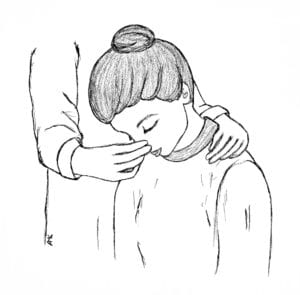Nosebleeds are common, especially during the drier parts of the year. However, they are usually benign and easy to treat at home. Most nosebleeds easily stop by themselves. If your child has chronic nosebleeds, your pediatric healthcare provider may refer them to an ENT specialist.
 How to Stop Nosebleeds
How to Stop Nosebleeds
- Sit or stand still and lean forward slightly. Do not lie down or lean back against something, as this causes the blood to flow backward into the throat.
- Pinch the soft part of the bridge of the nose to stop the bleeding. Keep pressure on for at least 5 minutes and do not check on it during that time as it may cause the nose to keep bleeding.
- Use a cold compress. Applying pressure while using ice or a cold pack will help to slow bleeding.
- If bleeding doesn’t stop in the first ten minutes of applying pressure, repeat the process. If, after two times of attempting to apply pressure, the bloody nose does not stop, please call your pediatrician or go to the emergency room or urgent care.
Nasal Packing
For chronic nosebleeds, you can purchase an intranasal device to place in your child’s affected nostril during a bleed. Nasal packing helps by applying constant pressure, forming a clot, and reducing bleeding. Often these devices are colloquially referred to as ‘nasal tampons’ and can be purchased from your local drug store.
Common Causes of Nosebleeds
Nose-picking
Young children may be breaking the nasal membrane by sticking their fingers in their nose. Toddlers may put foreign objects into their nose, resulting in similar damage. These nosebleeds are often benign.
Congestion
During cold and flu season and allergy season, kids can become congested, causing nosebleeds. Over-the-counter medications often make congestion worse in the long run. Consult your pediatric healthcare provider before giving your child congestion medications or nasal sprays.
Injuries
Injuries to the nose and face may be less severe than other injuries to the head. Because head injuries can be severe, keep your eye out for signs of a concussion. If your child has a headache, confusion, nausea, vomiting, lethargy, incoordination, memory loss, seeing stars, or dizziness, they may have a concussion. Contact your pediatric healthcare provider if you suspect your child has a concussion.
Dry, Cold Weather
Cold weather can cause the nasal passages to become dry and cracked. During cold and dry weather, those who get frequent nosebleeds can place vaseline inside the nostrils with a cotton swab overnight to decrease nosebleeds.
Coughing
Illnesses involving coughing can cause pressure on the nose. Because we typically do not recommend cough suppressants, there is no real way to prevent bloody noses during coughing illnesses. Instead, make sure your child is well-hydrated and as comfortable as possible. Teach your child how to manage a bloody nose and wait for symptoms to decrease.
When to Call your Pediatric Healthcare Provider
- Bleeding from both nostrils
- Pale and sweaty appearance
- Signs of a concussion (headache, confusion, nausea, vomiting, lethargy, incoordination, memory loss, dizziness)
- Chronic nosebleeds that last over 8 minutes
- Your child is on a blood-thinning medication, like aspirin, or similar medication
When to go to the ER
- Nosebleed lasting for longer than 20 minutes
- The bloody nose is due to a severe injury to the head
- Significant loss of blood
- Bleeding from the mouth or vomiting coffee grounds
For questions or comments, please respond to this post or contact us!




